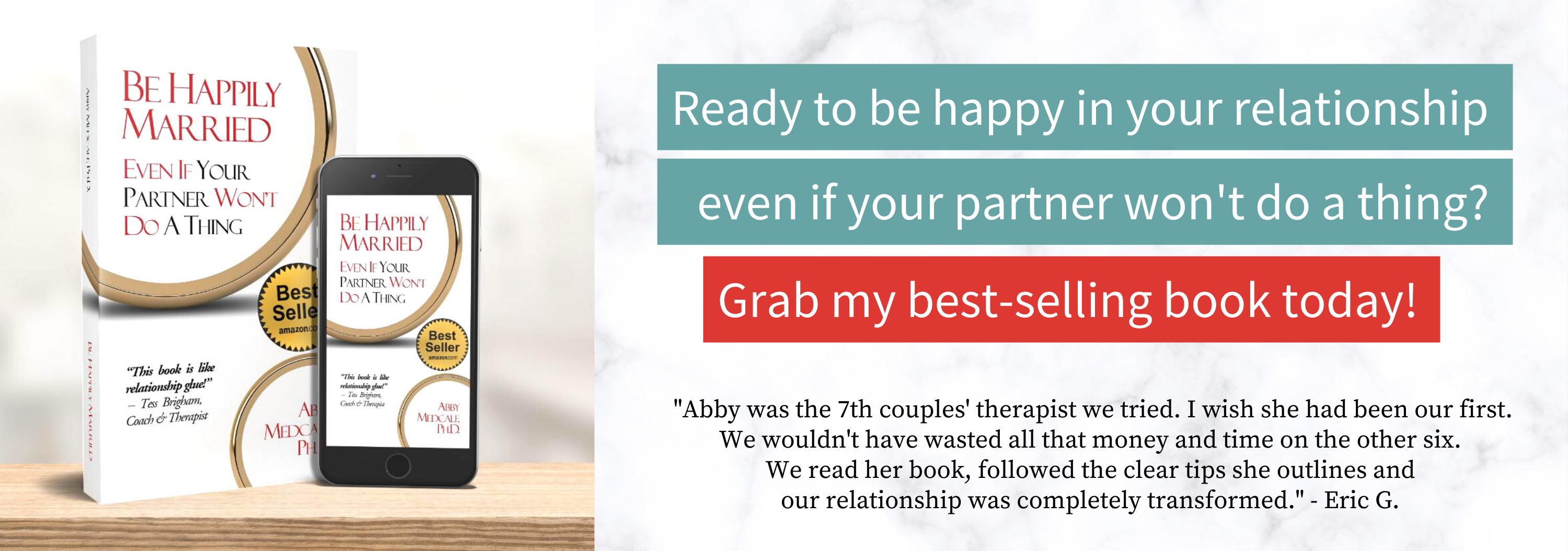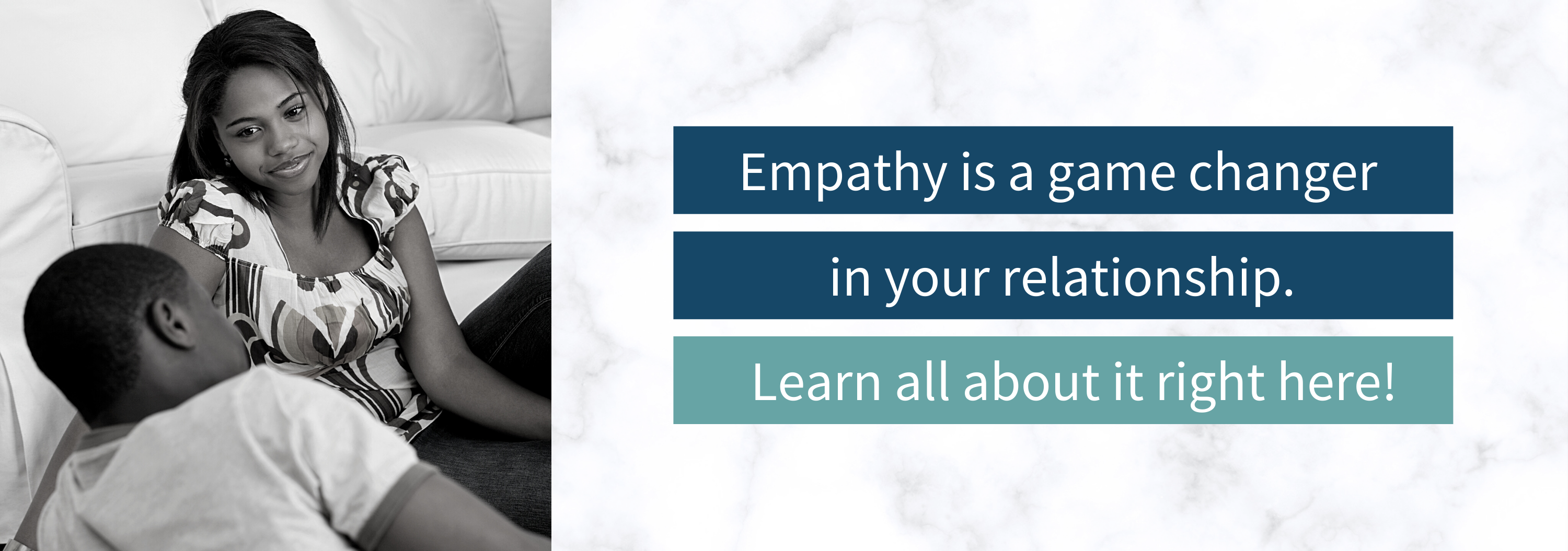
What do you do when you and your partner have mismatched sex drives? When you want more sex than your partner (or less sex than your partner), you end up with hurt feelings. The person who wants more sex often feels rejected and angry while the person who wants less sex often feels pressured and resentful. What you’ve been doing hasn’t been working or you wouldn’t be here right now! What you need is a new perspective and a new approach, so here are my top five tips to create the intimacy you’ve been craving if you and your partner have different sex drives.
11-minute read
Prefer to listen to the podcast? Click here!
I know you might be thinking that it’s always men who want more sex and women who want less but, according to the research, among heterosexual couples who seek sex therapy, men and women are equally likely to be the one who wants sex more than their partner. So, if you’re a woman and you’re the one who wants more sex, please allow yourself to feel normal and not like some sex-crazed weirdo. Or if you’re a man and want less sex, again, know that you’re also normal and this isn’t a blow to your manhood.
I also want to say that, as usual, I’m speaking to heterosexual couples here but the research on gender and sexual desire in general is very consistent whether or not you’re in a same-sex relationship or not.
The real problem is that you often can’t tell someone’s true sex drive until much later in a relationship. Evolutionary psychologists say that the initial phase of ripping off each other’s clothes is supposed to go away. That initial excitement is part of a biological function to bring two people together to pair-bond and raise a child together (which meant more resources for the child hence higher chances of it living and thriving). But, once you’ve got a baby happening, wanting to have sex five times a day would actually be harmful to that little person (oops, the baby fell off a cliff while we were in the cave boning and not paying attention). The idea is that, when the baby comes, you need to fall in love with it and not be obsessed with each other.
When you’re having more sex and touching more, it makes you want to have more sex and touch more so it can seem like everyone has a high sex drive in the beginning of a relationship. It’s only when the honeymoon phase ends in your relationship that you finally find out what each person’s real baseline sex level is! That’s when the discrepancies show up and it’s almost inevitable that one person will want more sex than the other.
The next issue is that the person with the higher sex drive often ends up feeling duped: “They weren’t like this when we first got together” and they feel frustrated and even undesired. Meanwhile, their partner who wants less sex is feeling resentful that they’re being pressured to have sex more often than they want. This creates its own cycle of disconnection, which then makes sex a hot-button trigger and an even bigger problem!
There are Many Reasons People Don’t Want to Have Sex
First of all, both men and women are equally susceptible to having a lower sex drive at different times over the course of a relationship. Some of the more common reasons are
- Depression
- Anxiety
- Self-esteem issues (often related to physical changes of aging or having children)
- Drug and alcohol use
- Changes in testosterone levels
- Stress about money, work, children or even stressors like, “Is this all there is?”
- Sex not being good
- Pain during sex
- Inability or pressure to orgasm
- Resentment – when grudges build over time a person often becomes passive aggressive and withholding with their partner so sex isn’t wanted
- Disconnection – when partners become emotionally distant it often looks like this: men want to have sex to feel close, and women want to feel close to have sex so this emotional distance creates a wedge
So, what do you do if you and your partner don’t have the same sex drive?
Mismatched Sex Drives: Top 5 Tips When Your Sex Drives Don’t Match
Tip #1: No One is Right When It Comes to Mismatched Sex Drives
It’s not “right” to want more sex and “wrong” not to. Often couples get caught up in a sort of tug-of-war where both think that their position is the correct one and this just furthers the divide.
When it comes to mismatched sex drives, stop thinking that you’re right and they’re wrong. Instead, remember that there are lots of differences in preferences in your relationship and that it’s important for people to feel unconditionally accepted, not just unconditionally loved. You are your partner are a team and this is a team issue.
Watch this quick video on unconditional love and unconditional acceptance to learn more:
Tip #2: Don’t Take it Personally
One of the biggest issues I see when there’s a difference in sex drives is that people are (most often wrongly) deciding what it means. For example, if you’re the person who wants more sex, you likely say to yourself: “My partner doesn’t find me attractive,” or “They don’t care about me anymore.” Your partner’s lack of interest might have absolutely nothing to do with you. It’s likely a lot more about how they’re feeling about themselves than about how they feel about you. You’re just filling in the blanks and deciding something with absolutely no proof of this (except what you’ve made up in your head).
When you think something, you end up with a self-fulfilling prophecy because of your brain chemistry, which you can learn about right here:
If you’re the person who isn’t as interested in sex you might be thinking, “They don’t care about me, or they wouldn’t be pressuring me” or “They want sex too much, it’s not normal.”
Again, your partner wanting to have sex more often than you doesn’t mean any of those things. You’re likely feeling defensive and hurt so you’re lashing out to make your partner “wrong,” but there are not “wrongs” or “rights” in this – there’s only two people trying to connect.
Tip #3: Try a Little Tenderness
Empathy is a game-changer when you and your partner aren’t on the same page about anything and especially when you have mismatched sex drives. If you want more sex than your partner, has it occurred to you that your partner would likely love to have a higher sex drive? Has it occurred to you that they’re probably lamenting the fact that they don’t get turned on easily or don’t enjoy sex? It sucks when you can’t find the motivation to do something that you know would help your relationship.
If your partner has shared that they’re uncomfortable with sex due to how they feel about their body, don’t just tell them that they look great. This dismisses their feelings and creates a divide. Instead, empathize with how uncomfortable they’re feeling. So, you might ask, “Is there anything I can do to help you feel more comfortable?” Or share a time when you’ve been uncomfortable in your own skin. This vulnerability and openness will create closeness and trust (keys for a happy sex life).
And if you’re the person who wants sex less, do you realize that your partner is looking for a connection with you they don’t share with anyone else? Or that your partner sees this as a deep connection they can only get with you?
Remember, the person who wants sex more often ends up feeling sexually and emotionally frustrated; they’re feeling rejected and even abandoned. And the person who wants sex less is often feeling pressure to be different and to feel more sexual so they don’t feel accepted for being themselves. Get in touch with these feelings with your partner. We always connect from our feelings about things, not our thoughts about them. Having this disparity in your sex life isn’t just hard for you, it’s hard for your partner too. Empathize first and see where that leads.
Tip #4: Create Conditions that Foster Connection
In my over three decades of working with individuals and couples, here’s what I know: When people are less stressed, they’re more open and willing; They’re happier and find it easier to connect. And the same is true when it comes to mismatched sex drives. So, look for ways to make your partner’s life less stressful. When we feel our partners have our backs, then we feel heard and seen in our relationship (which always leads to more sex and emotional intimacy).
This deeper connection is what the friendship portion of your relationship is also built on. The research says that having a strong friendship is a precursor to a strong sexual relationship with your partner. Are you being their friend? This means
- Doing things that are important to your partner
- Doing what you say you’re going to do
- Prioritizing your partner and their needs over work, kids or other family members
- Doing small gestures to show love (random acts of kindness)
- Don’t nag. Instead, set up support such as a Couples Business Meeting or hiring outside help before always looking to your partner to “pull their weight.”
- Don’t be judgmental or critical. Be kind, appreciative, patient and complimentary
Each day, think of ways you can be more affectionate, caring, thoughtful, kind and patient with your partner. Don’t do these things to have more sex. Do these things because you’re focused on why you love your partner. When you’re focused on what you’re not getting, you’re not focused on what you are getting. It’s from that place of abundance and seeing all of your partner that more intimacy, trust (and ultimately sex) will happen.
Tip #5: Make Your Sex Life a Priority and Take a Different Approach
If you keep doing what you’ve always done, you’re going to get what you’ve always got. Get out of this idea that you’re right because that’s not working. Do you want to be correct or effective? Take personal responsibility for making your sex life better and this means thinking about it from a new viewpoint because what you’ve been doing isn’t creating the changes you want!
Right now, the mismatched sex drives issue has been ongoing, so it has become a hot-button topic with both of you telling yourself a story about the way it is. If you want a different outcome, you’re going to need to change that story. Your partner isn’t rejecting you and you’re not over-sexed.
To change the story, you want to think different things and then do different things.
To think differently, focus on having the next best-feeling thought. I’m not going deep on that here because I cover how to do it, in depth, right here in my article about the easiest and most effective way to solve any problem.
As far as doing different things, the list is endless. Desire in a long-term relationship, generally shows up because of what you’re doing together, especially if what you’re doing has a little sexiness to it. So, it’s time to get creative. You could
- Learn something new together. We know that when you learn something new with your partner (the brain loves novelty) it releases a bonding hormone called oxytocin. It needs to be new for both of you: take up ice skating, go to an ashram, or do something simple like going to that Ethiopian restaurant you’ve been saying you want to try.
- Touch more. The more you touch, the more sexual desire is ignited. Before you leave for the day, or when you first get home, kiss your partner full on – make out a little! Lots of non-sexual touch is a great thing.
- Have a special “happy hour” each day after work. No kids allowed but it’s a time to have a drink (non-alcoholic is OK, but make it special) or some fun treat to eat and sit outside for a moment or relax in your bedroom and just chat and unwind before jumping into “all the things” for the rest of the night. Your kids will understand if you’re clear that this is a priority.
- Plan fun things to do together – I don’t like calling it “date night” because I think that often has negative connotations but plan fun things you know your partner will enjoy!
- Do sexy things but take sex off the table; this builds psychological sexual desire. For example, you could share a fantasy, read an erotic book aloud to one another, check out a local kink club, or even watch some porn together. State beforehand that there’s not going to be any sex, just some titillation.
No matter what, I want you to remember that sex is supposed to be fun and connecting so approach any differences you have with that energy! This means you approach the issue with love-based emotions like respect, humor, appreciation, patience and high regard for yourself and your partner.
I know you’re feeling frustrated, but this isn’t your partner’s fault and it’s also not your fault. You’re a team and it needs to be worked out with a spirit of togetherness.
Resources
What to Do When the Honeymoon Phase Ends in Your Relationship
Feeling Resentful or Stuck in Your Relationship? It Might Be Your Reticular Activating System!
Developing Empathy in Relationships is the Key to Connection and Communication
Building Trust in Your Relationship
The 5 Reasons Why Having a Couples Business Meeting Will Change Your Relationship
Don’t Keep Score in Relationships
8 Rules for Giving Great Feedback
The Easiest and Most Effective Way to Solve Any Problem
Finding the Spark Again in Your Relationship (or for the First Time)
Fall in Love with Your Partner Again
Research









